
Nationalism is the movement that aims to promote the achievement of a certain degree of independence of a people with respect to external conditions.
Nationalism is a term that has different meanings according to the dictionary of the Royal Spanish Academy (RAE) . On the one hand, it is defined as the affection and sense of belonging of the natives of a certain nation with respect to it. To give some examples: "In many countries, nationalism is only seen after sporting success," "Wars are tragedies that serve to awaken the sleeping nationalism of the population."
The etymological origin of the word is found in Latin. Specifically, it is made up of two differentiated parts such as nasci which means "to be born" and the suffix -ismo which is equivalent to "system, theory, doctrine or tendency" .
The aspiration of a people to obtain a certain level of independence from external conditions is also defined as nationalism: "I want a political program that defends nationalism and maintains state ownership of our most important companies." In this sense, it can be highlighted that in Spain there is Catalan nationalism , which in recent years has produced demonstrations where a part of the population of this autonomous community demands its independence.
Types of nationalism
In addition to all this, we can state that there are various types of nationalism among which, for example, the so-called integrative nationalism stands out, which is one that is based on the intention that populations from different States but that share many characteristics unify.
In complete contrast to the previous one is disintegrative nationalism , which is defined because it strongly supports the secession of a part of a State since it is considered that the population of that part has signs of identity that differ from those of the rest of the aforementioned country.
These are the two most important types of nationalism, however, we cannot forget that there are others that take various aspects of society as a central axis to establish themselves and establish themselves. Thus, we find, for example, economic, cultural, ethnic and religious nationalism .

Nazism was based on nationalism.
Base of political movements
It should also be noted that multiple political movements can be based on nationalism. The fascist regime of Benito Mussolini and the Nazis of Adolf Hitler proclaimed themselves nationalist and, under that flag , they attacked other countries.
These historical cases also show that the concept of nationalism changes with history : Hitler associated his idea of Germany with the Aryan race and excluded other social groups born in German territory from the nation. This means that, for Hitler 's nationalism, a Jew born in Berlin did not belong to the German nation. For other people, however, nationalism is closely associated with the place of birth.
